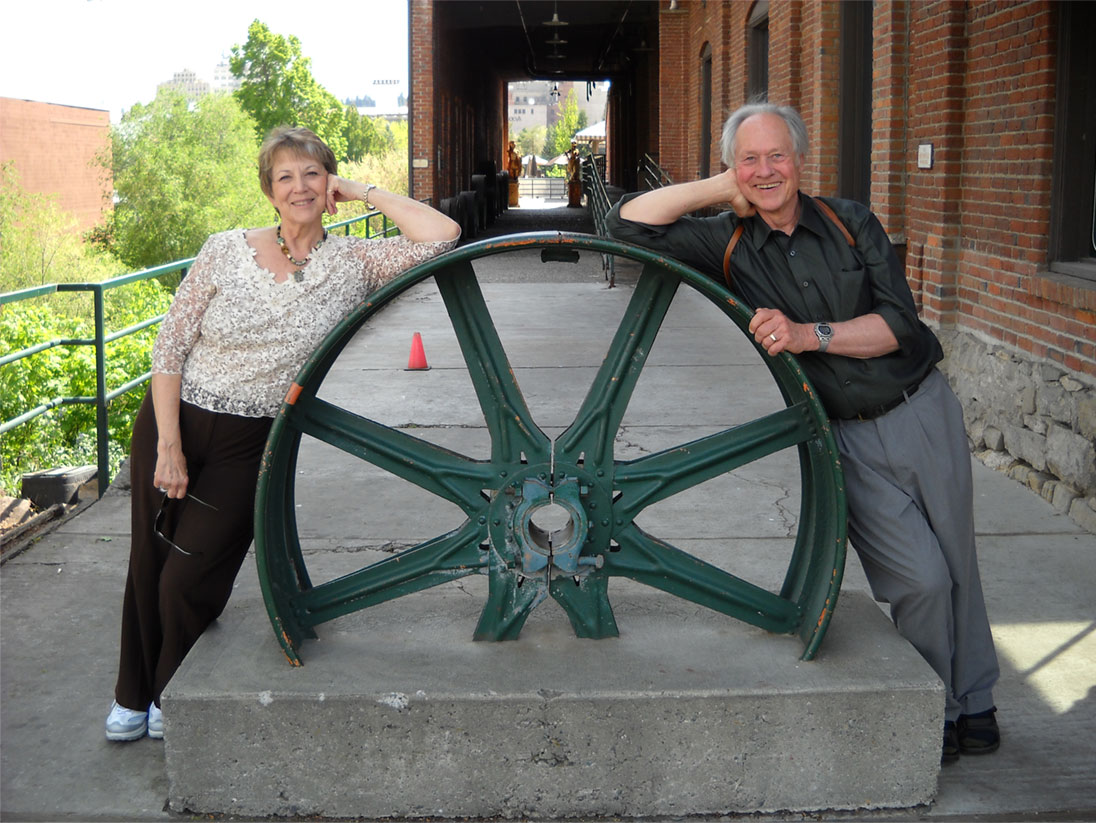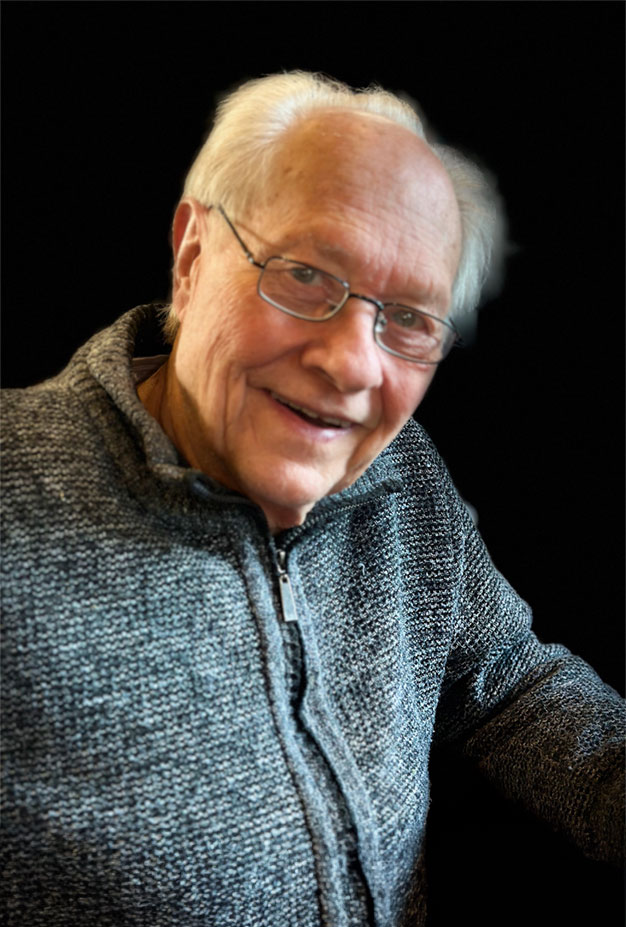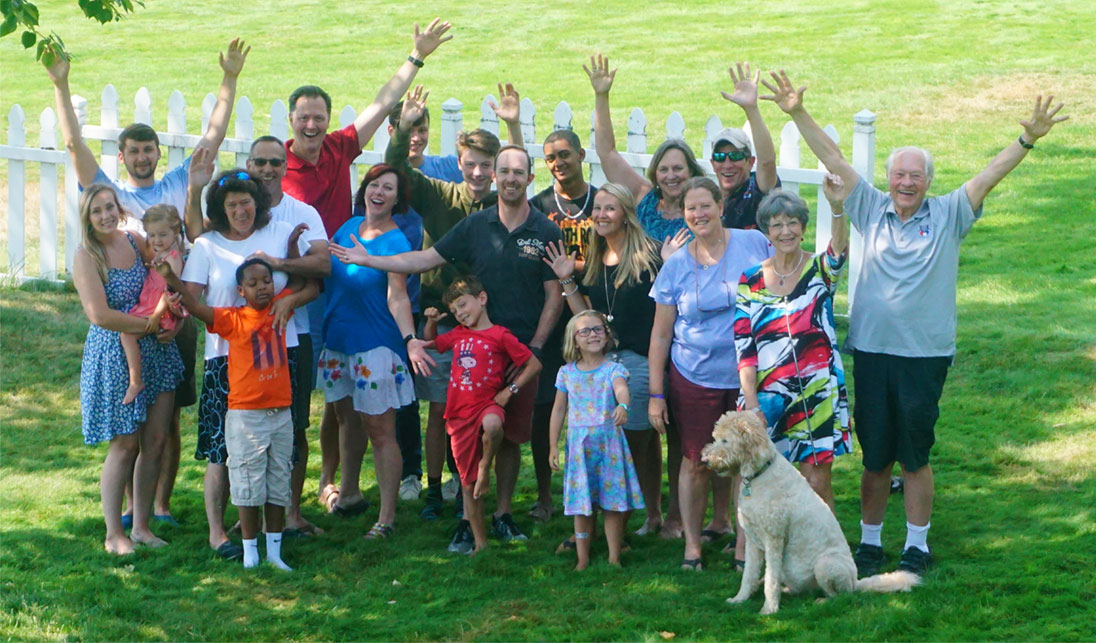Raising Kids with Love and Logic
From the Winter 2024 Issue
Meet this issue's interview subject, Dr. Foster Cline

HERMIE AND FOSTER CLINE.
Dr. Foster Cline is known in Sandpoint primarily for his stunning photography and his fundraising efforts for the Panida Theater, but as De Niro is to acting, so Cline is to raising responsible children. He is quite famous in the arena of parenting.
Cline has worked with children—lots of children—and their parents, and he and his wife Hermie have raised three birth children, one adopted daughter, and fostered three children. He has toured the world giving workshops on the philosophy and techniques he and educator Jim Fay wrote about in “Parenting with Love and Logic,” which spawned more books and an institute dedicated to providing practical resources to parents.
When explaining parenting concepts, Cline slips in and out of role-playing either as a child or as a parent. He has a way of captivating listeners with humorous, relatable scenarios and plenty of quips.
Growing up in Denver, he spent summers on a ranch high in the mountains near South Park, Colorado, where he and his brother rode horseback, fished, and lived out of a small fiberboard trailer doing all kinds of activities now considered unsafe for children.
A learning disorder in elementary school led to less than promising grades. “However, my parents assured me that school was not the end all, be all,” he noted. “They were the perfect parents for me, and I wish more kids with learning lags had parents like mine. I was stellar at shooting pool, and my parents encouraged extracurricular activities that I excelled in. ‘Foster, you are a dead-eye shot with a rifle.’ They assured me that pool and marksmanship were the things that counted.” Still, Cline graduated summa cum laude from the University of Washington and then undertook medical school internships in obstetrics, pediatrics, and surgery.
He spent what he calls his “productive years” writing books, heading up Love and Logic, Inc., running a clinic of 12 therapists, and giving workshops to parents and school personnel in most states and a dozen foreign countries.
He and Hermie have been married 63 years. “When you see a longstanding couple, married for decades, the woman deserves most of the credit.”
The pair moved from Colorado to Sandpoint in 1993 to retire in an area he calls, “Colorado or Montana done right!” He served as a trustee for the Lake Pend Oreille School District in the early 2000s.
Now 83, Cline and his wife enjoy their lakeside home in Sandpoint. He is still working with parents who have children enrolled in private school in the area. He rides his bike, calling it his “hybrid transportation, muscle and motor.” He spends time writing short stories and memoirs and is a member of Artworks Gallery, where his photographs are displayed.
A book featuring vignettes of his early practice as a psychiatrist, including a collection of his creative writing, will be published before the end of the year.

AFTER A LIFETIME IN PSYCHIATRY, CLINE SAYS “THE HUMAN MIND AND HOW IT OPERATES IS THE MOST INTERESTING OBJECT IN ALL CREATION.” COURTESY PHOTO.
Q. Why did you choose psychiatry?
A. The human mind and how it operates is the most interesting object in all creation. I recall one patient whose diabetes was completely stabilized and then whenever the patient’s mother would visit her in the hospital, bingo, her blood sugar would go up to 300. A lot of physiology is controlled by the mind. Hermie’s dad was a general practitioner of the old school. He operated and delivered babies, but said that much of his practice was spent dealing with bodily issues affected by the psyche.
My mom and dad taught me not to be overly goal-oriented. My dad said, ‘God will put forks in the road. Foster, always take the road with the most forks.’ So I chose psychiatry because it led to the most paths: social psychiatry, child psychiatry, academic psychiatry, pharmacological and behavioral psychiatry…endless options! That’s not really true of many specialties. Child psychiatry has been fulfilling. The parents who will bring their kids to a child psychiatrist are usually loving and high-functioning. And when you give them tips, they will do them.
Q. You then went into private practice?
A. When I was working at the Seattle V.A. hospital as part of my residency program, I discharged six veterans who were taking advantage of the system and costing taxpayers a pile of money. The head of the hospital took this young physician to the proverbial woodshed and told me that I couldn’t discharge anyone unless I had admissions to take their place. I protested and he shouted at me, ‘Cline, you have three choices: You can stay in the system and bitch and moan about it. Or, you can stay in the federal system to make it better, which in your case is unlikely. Or, you can go out and build your own system and run it however the hell you want.’
That was a seminal moment in my life. So that’s what I did. I built my own system and it worked pretty darn well.
Q. What are the main principles of Love and Logic?
A. Love and Logic coined the terms now widely used to divide parents into three types—helicopter, drill sergeant, and consultant parents. If you want a kid that is thoughtful about their choices and behavior, the parents will use consultant or questioning techniques. The Love and Logic home is a parent-centered one, not child-centered. Punishment is out, consequences with empathy is in. The rule is that parents set the model by first taking good care of themselves. Early in childhood, when a child is being low-grade obnoxious, the Love and Logic parent says, with a loving but firm hand on the shoulder, ‘Honey, I don’t want to hurt your feelings, but I find you annoying. I need you right now to go anyplace I’m not. You are draining my energy. We will figure out later the numerous ways you can put more energy back into my system. Try not to worry about it.’
Love and Logic is built on choices and consequences. It doesn’t use a reward system, a level system, or behavior modification. It teaches parenting and communication skills. People fit each other. Parents who feel guilty raise kids who blame. Over-controlling parents raise rebellious children. If you see a whining child, they have pleading parents. Kids who ask stupid questions have parents who answer them. Parents best show their power simply by taking good care of themselves, not punishing the child.
When children are rescued by their parents, they naturally make poorer choices. Like anyone, kids can control their parents from the “poor me” position. Love and Logic teaches parents to use loving but consequential phraseology. When the teen of a Love and Logic parent takes risks with unlawful behavior or falls in with a tacky pack of peers, the parent might say, ‘Sweetheart, I’ve been considering your options. Do you have the number of the public defender? If you do have any trouble with the law, you might only have one phone call. Don’t waste it on me.’
When a child is experiencing a problem, it is best to support, by giving ‘thoughts’ and ‘observations’ rather than ‘advice’ and ‘suggestions’ along with a smattering of “can do” assurances: ‘If anyone can do this, I know it’s you.’

THE CLINES WITH THEIR CHILDREN AND GRANDCHILDREN. COURTESY PHOTO
There’s a lot of kids these days who honestly believe they don’t have to do anything to contribute to the home. Kids should be given easy chores when they are three or four years old. It prepares them for adolescence and teaches industry and initiative. Otherwise, you end up with entitled teens and adults.
When I was a young parent, I asked a farm mom who had great kids what her secret was. She said, ‘If the eggs aren’t gathered, nobody has breakfast.’ The thing that gives people a high self-image is what they’ve achieved and accomplished. One foster kid said, “No wonder you take in kids—you have so many chores for them to do.” Hermie laughed, hugged the kid and said, “If kids aren’t good for free labor, what are they good for?”
Q. In Love and Logic, would you pay kids for good grades?
A. When a parent gives a kid a reward, it should be for something the parent feels joyful about, and the kid absolutely should reply, ‘Thank you.’ When a child expects or demands money for achievement it is a bribe. When parents joyfully want to give something, it is a reward. The reward is generally unexpected, but may be hoped for. It is far more important than many parents realize to insist children learn early to say ‘please’ and ‘thank you.’ Entitled folks never use those words.
Q. If your kids are still living at home in their 20s, is it too late to apply Love and Logic techniques?
A. It is never too late to use Love and Logic with any relationship, at work, with adult relationships, and with older children living at home. An older child may be at home because of “failure to launch” or as a valued contributing member of a family such as that which takes place when an immigrant family lives together above their shop or restaurant. In some cases, of course, older special-needs children are cared for at home.
If the issue is “failure to launch” then the correct answer is simple, but the implementation is difficult because the situation between parent and child is often co-dependent, and the parents feel between a rock and a hard spot.
Twenty-year-olds contributing to their board and room and who are “respectful, responsible, and enjoyable to be around” are often a blessing to their parents. If older children living at home give little to the common good, then they come to consciously or unconsciously disrespect their parents, resulting in lowered self-respect and a poor self-image. That leads to an angry, disrespectful, or depressed young person. Either way the child controls the situation.
Q. Enlisting your psychiatric background, how important are dreams?
A. This is a subject for a book that a human cannot write.
The essential question is not what a dream means but why we sleep and dream in the first place. Few really give much thought to the fact that a third of life is lost in a suspended state called sleep, filled with the activity called dreaming, and no expert knows why. And really, no one really cares! If you take a while to think about this, you might feel like walking into the water and never returning. When one starts considering why we sleep and why we dream, there may be hope but that leads into a rocky road about the nature of reality itself. And the average soul does not venture there. We pretend to understand sleep and dreams because we can cite facts about Delta waves and rapid eye movement. That’s certainly correlational, but why does it all happen? There are a hundred suppositions, and not one has been proved.
Q. What are you working on for the Panida? I read the theater now has a new roof.
A. Pure and simple, the Panida has survived because of those who have loved the arts in our town and the persistence, foresight, and hard work of many volunteers over the past 100 years. This old art house is worth saving. I feel the presence of those people every time I walk through the lobby.
Now, in the digital age, the relatively few old beautiful theaters that are left are recognized as unique, functional, and essential. They provide folks with a shared potpourri of emotions while they are seated inside a historic cocoon of art. Wow! This experience is unequaled in any other public venue.
We are in the midst of raising money for the Century Fund. TING, the staff, board, and others throughout our area are stepping up to ensure the success of this 1.9-million-dollar undertaking culminating with the Panida’s 100th anniversary in 2027. In order to flourish in our digital age, the Panida must maintain its historic structure and fabric while updating lighting, sound, and other infrastructure necessary as our town and theater attract an increasing number of outstanding national performers. The stage must be enlarged and together the Little Theater and Panida will merge to form a performance campus that meets the requirements increasingly demanded by discerning performers.
Everyone should do themselves a favor and find the joy of volunteering during a performance. And they should go to www.panida.org and subscribe to the newsletter.

FOR PEOPLE OF HIS AGE, SAID CLINE, “ THE COMPUTER IS A MAGIC MACHINE,” AND MANIPULATING IMAGES IS AKIN “TO SORCERY.” ABOVE IS AN IMAGE OF A HAWK IN FLIGHT THAT HE CHOSE TO WORK HIS SORCERY UPON. COURTESY PHOTO
Q. How would you describe your photography?
A. I enjoy the creative aspects of photography from framing the picture to photoshopping. For those of us who grew up in the non-digital dark ages, the computer is a magic machine. And working with photos is just sorcery! Millennials and those of more recent birth take digital magic for granted, but we old geezers revel in the technology that has unfolded before our stunned lifetimes.
When I sit and play with these photos, I am like a toddler just introduced to a sandbox, looking in wonder at the pixel grains that can be manipulated, spread, poured, colored, and formed! Can life be any sweeter!?




Leave a comment